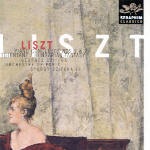Every so often these performances would turn up as an EMI special import. At budget price, one hopes this disc will enjoy a long life in the domestic catalog. György Cziffra’s Liszt packs in a thrill a minute, replete with madcap runs, petulant accents, filled in chords, heart-stopping speed-ups and slow-downs, plus rapid transit fingerwork galore. The pianist emphasizes salient points through ferocity and attack, making his lean, bony sonority work to his advantage. Compared to his earlier EMI versions (included in the boxed set Les Introuvables de Cziffra), Cziffra’s jets had cooled a bit when he came to remake these concertos with his son at the helm. Moreover, the Orchestre de Paris is no match for the Philharmonia Orchestra. At the same time, certain details of orchestration are clearer in these remakes. And Cziffra still commanded the most amazing tremolos and interlocking octaves in keyboard history, while imbuing Liszt’s lyrical passages with contrasting nobility and introspection. In sum, this recording offers an inexpensive way to get acquainted with the most unique and important keyboard artist not included in Harold C. Schoenberg’s book The Great Pianists.
































